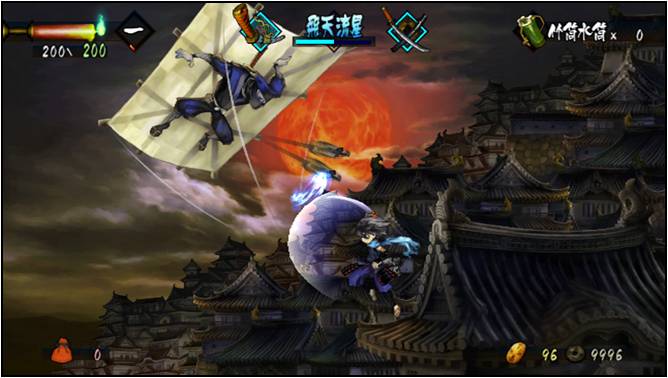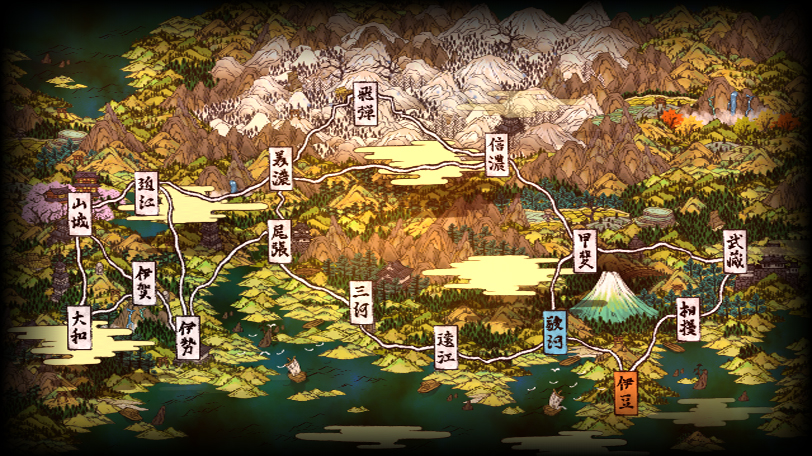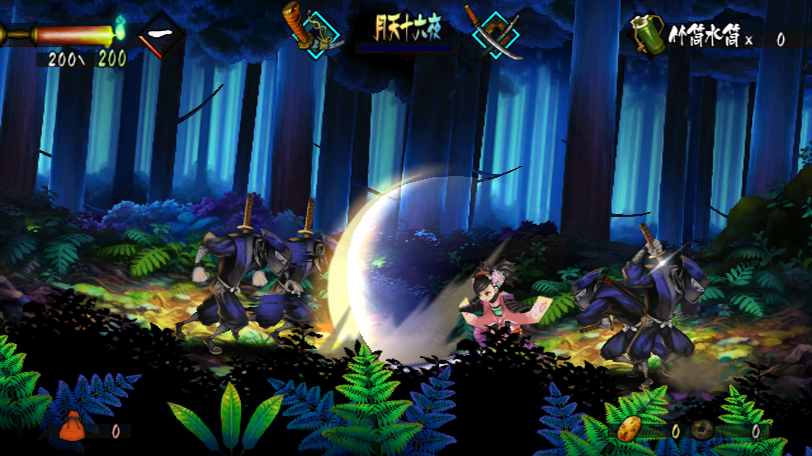Muramasa: The Demon Blade, being published by Ignition
Entertainment, is a hack-and-slash side-scrolling game that harkens
back to the mythical and classical period in Japanese history. With
a very anime-esque artistic styling, the characters jump off the
screen as very dynamic and unique. With characters ranging from
shape-shifting kitsune, fox demons in Japanese folklore, to the very
stereotypical strong-armed samurai and everything in between,
players are sure to find a character or opponent which they can
latch onto.

The backgrounds are very elaborately designed with an attention to
detail so rich you can see the brushstrokes from the artist’s
palette. The backgrounds range from winter scenes beneath the sakura
trees to mountaintop views from rice farmers’ villages all the way
down to the crowded red light districts of old Edo. The artwork is
all tastefully done using a 2D hand-drawn style in such a way as to
portray real-life but still retain that whimsical feeling of fantasy
inherent in the underlying Japanese folklore.
No
game is complete without a musical score to back it up and Muramasa
does not disappoint. The music is crafted in the classical Japanese
musical stylings with hints of fantasy music fans of the Final
Fantasy series will be able to easily relate to. The score underlies
the game and does not subtract from the gameplay value as many
titles do with an overwhelmingly grandiose and loud background
score.

The gameplay follows the basics of a side-scroller with movement and
fighting actions reminiscent of the Castlevania series. The
characters maintain a very high graphic level throughout the
gameplay. Players can choose from two playable characters that move
through their environments utilizing movements typical to a
side-scrolling platform game; i.e. running, jumping, etc. Depending
on which character is chosen, the adventure goes in opposite
directions. If Kisuke, a young ninja with amnesia, is chosen;
gameplay flows from Edo to Kyo and vice versa if Momohime, a young,
possessed princess from the Mino province, is chosen. Both carry 3
separate katanas at one time out of the possible 100 plus available
to collect or forge in the game.
The game uses the classic controls and is in no way solely a
Wii-ware game. The classic controller, GameCube controller, and the
Wii Nunchuk are all viable means of controlling the gameplay.
Players progress through the game fighting enemies ranging from
giant toads to ninjas all the way up to giant skeletal demon horses.
A boss fight can be expected at the end of all of the 30-plus levels
each character must surpass. Certain levels have bosses you must
conquer prior to moving on within the level. Levels are arranged
very linearly in a Metroid-like fashion with some backtracking
required in order to make any substantial progress.
The game has two difficulty settings. The first is a beginner’s
level with gameplay at its easiest. The next level is an
increasingly difficult setting with more fights and harder bosses.
Rumors have it that a third level can be attained by defeating the
game on the easy setting in which the player only has 1 HP to last
the entire level regardless of leveling up. Understandably, this has
been titled ‘Insane Death Mode.’ In the player’s down time they can
travel the levels and buy items from shopkeeps, forge new swords
with supplies and the help of an odd demon swordsmith, or even sit
down to enjoy a delectable bite of sushi.
Hack-and-slash swordplay is rampant in the game with plenty of
slashes, combos, and special moves to tear opponents to pieces.
There are two types of swords in the game: tachi and odachi. The
tachi swords are small, swift swords capable of dealing out lots of
small damage in plenty of rapid combos while the odachi are larger,
more powerful swords with a slower speed and significantly higher
damaging power. Unique to the game is a sword gauge which is used to
determine how much more of a beating your sword can take. The demon
blades are nourished by the souls of your slain victims which help
to level both you and your sword up. If you run out of ‘soul power’,
your sword will break and you will no longer be able to wield it in
your defense. At this point in time you have the option of drawing a
second sword if you have any left in your arsenal, or run away and
try to avoid all danger until your sword regains its fighting
ability.

Amidst a classical-era Japanese world where souls of the dead and
demonic entities roam free, it is your job to restore a peace that
has been unleveled as a result of a power-hungry shogun’s play for
power and the demon blades. Gamers can expect Muramasa: The Demon
Blade to hit retailer’s shelves sometime in early fall of 2009.
Sit back relax, let's play
Shael Millheim
It's game on!
Chet Scott